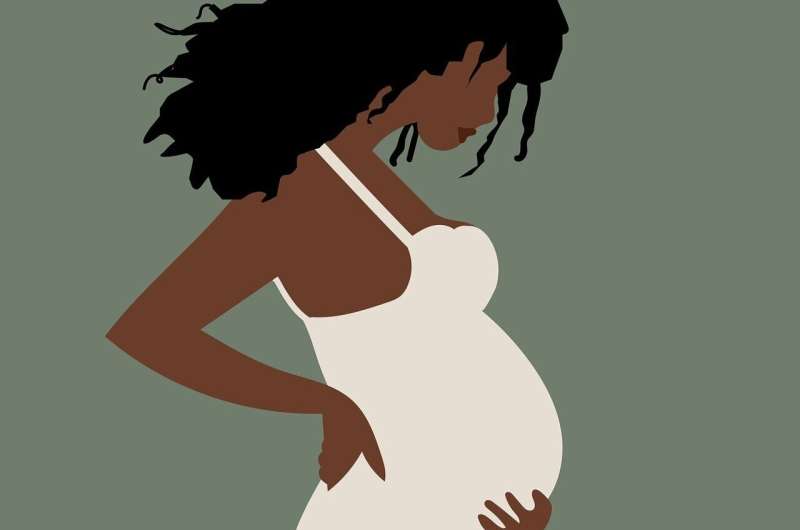This article has been reviewed according to Science X's editorial process and policies. Editors have highlighted the following attributes while ensuring the content's credibility:
fact-checked
peer-reviewed publication
trusted source
proofread
After 2016 Presidential Election, women of color had more underweight, premature babies, study finds

In 2016, President-elect Donald Trump vowed to deport thousands of immigrants. His anti-immigration message vilified foreign-born people living in the U.S. as criminals and rapists. Besides making good on many harsh, immigration-related promises, the years after his election stoked the anxieties of millions of people.
Now, with Trump once again in contention for the White House, a new study from the University of California, Berkeley, reveals the surprising—and potentially lifelong—association between those early Trump years and the health of society's newest citizens.
In the two years after Trump was elected, there was a significant increase in the number of non-white women in the U.S. who gave birth to children who were premature or underweight, researchers report in a study published today in the journal Demography. The increase in underweight and premature births was especially pronounced for children born to Black mothers, the study found.
"Elections matter to health in enduring ways," said Paola D. Langer, a postdoctoral fellow at the campus's Goldman School of Public Policy and study's first author. "Our results show a link between the two years after Trump's election and an increase in adverse birth outcomes among non-white groups in the U.S. that is likely explained by a combination of stress and policy impacts."
To understand the effect Trump's election may have had on newborns, researchers analyzed Centers for Disease Control and Prevention data from more than 15 million U.S. births between November 2012 and November 2018. The CDC records account for all infants born nationwide. Low birth weight and premature births are widely used metrics linked to both infant mortality rates and physical and cognitive development later in life.
Rates of low birth weight and preterm births increased for Black, Hispanic and Asian Pacific Islander mothers in the two years after Trump's election compared to the years when Barack Obama was president.
Black mothers had the largest increases in children born underweight, a 0.62 percentage point increase, according to adjusted models. In other words, if Trump hadn't been elected, the analysis suggests, about 3,783 fewer infants may have been born underweight.
While the percentage point difference may seem small, the effect is alarming when extrapolated to the population, Langer said. For perspective, a recent study found that exposure to large wildfires was associated with a 0.2% increase in infants with low birth weights.
"The changes we observed for infants born to U.S.-born Black mothers in the first two years after Trump's election are approximately three times as large as that of the wildfires," Langer said.
Society-altering events like elections, large-scale protests, wars or disasters are known to affect population health—especially when those events espouse and foment racism, xenophobia and hate. Much like the pandemic put a microscope up to societal inequalities, major political and social events disproportionately harm disadvantaged and marginalized groups.
Even still, the findings are jarring, said Caitlin Patler, an associate professor at the Goldman School of Public Policy and co-author of the paper.
"It is always shocking to quantify the health harms that may be the result of structural racism and xenophobia," Patler said. "That thousands of infants may have been healthier had the election not occurred is incredibly troubling."
Added Erin Hamilton, the paper's senior author and a UC Davis sociology professor: "We don't usually think about things like elections harming health, but insofar as major political events cause stress, which we know they do, they can have physical health consequences."
Langer and Patler cautioned that their analysis could not rule out what role events other than the election may have contributed to the increased rate of low birth weights. For example, the racist and widely viewed Unite the Right rally, a white supremacist event held in August 2017 in Charlottesville, Virginia, overlapped with the time period they were studying, as did other events that could have contributed to the changes.
Regardless, Patler and Langer said, something major changed after the election of Donald Trump. They hope future research will be able to more directly link the causes and track the effects of such disruptive, anxiety-inducing events.
"Racial disparities in health can change rapidly and substantially following macro-level political events that are racialized or xenophobic," Langer said. "In this case, Trump's election appears to have affected the life chances of even the newest members of U.S. society: infants born in the two years after he took office.
"The legacy of these health harms could be long-lasting and dire."
More information: Paola D. Langer et al, Adverse Infant Health Outcomes Increased After the 2016 U.S. Presidential Election Among Non-White U.S.-born and Foreign-born Mothers, Demography (2024). DOI: 10.1215/00703370-11477581




















